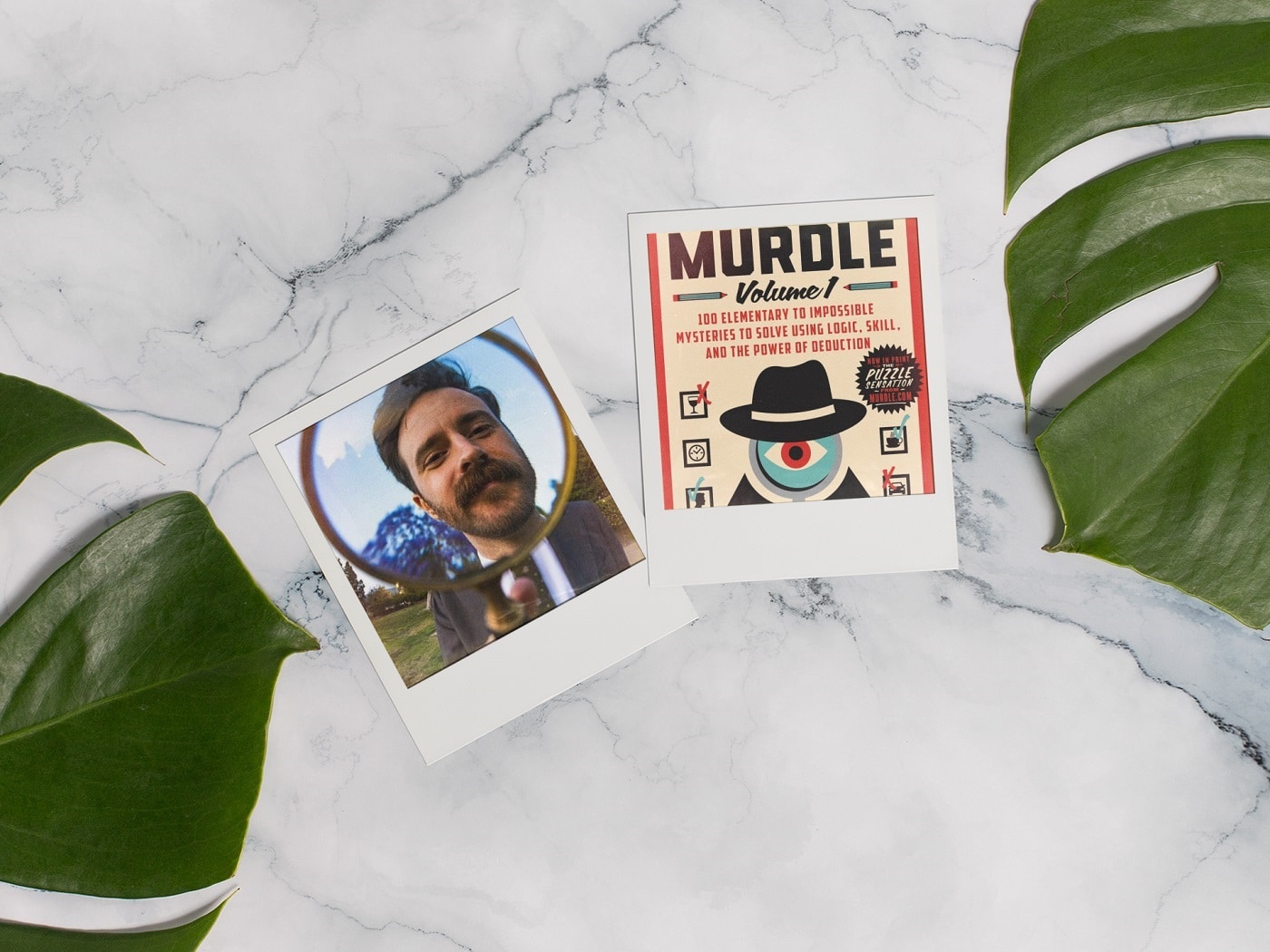The newly-released Murdle Vol. 1: 100 Elementary to Impossible Mysteries to Solve Using Logic, Skill, and the Power of Deduction is an exciting book by the charismatic G. T. Karber based on the daily puzzles appearing on Karber’s wildly popular Murdle.com site.

These puzzles combine the engagement of a good brain-teaser and the excitement of a murder mystery into one hell of a terrific armchair activity. Higher stakes than Wordle, more colorful characters than Sudoku, and kind of like crosswords for mystery novel obsessives.
Karber has staged dozens of immersive whodunits in the L. A. area as a member of the Hollywood Mystery Society, a theater ensemble and cinema social club. What follows is a conversation with him on the book, Murdle, and more:
What is the Hollywood Mystery Society–who put it together, and what do its members do?
The Hollywood Mystery Society is a cinematic organization out here in Los Angeles. We have staged dozens of mystery shows, movie screenings, mini-haunts, bar-crawls, online experiences, and more.
I can’t really remember a time I wasn’t into mysteries.
It’s both a private club and a theater ensemble. Over the pandemic, we built a virtual space where we could host events online: we did online games, concerts, and parties during all of quarantine. Currently, we stage the monthly Murder at Tara’s, at Tara’s Himalayan in Los Angeles. And the members were the first round of testers for Murdle: they provided some of the best and most well-informed suggestions.
Were you interested in crime fiction and movies before you began orchestrating immersive whodunits?
Absolutely. I can’t really remember a time I wasn’t into mysteries. As a kid, I devoured Encyclopedia Brown books, and these children’s Clue books. I also loved Encyclopedia Brown-author Donald J. Sobol’s Two-Minute Mysteries, which was an update of the old One Minute Mysteries by H. A. Ripley.
I guess I’ve always liked short bite-sized mysteries, which is just what Murdle is. During the pandemic, though, I got obsessively interested in Agatha Christie. I think I read 40 or 50 of her books in 2019, and once the vaccines were available, my brain had been rewired by Dame Agatha.
How did you come to develop Murdle?
I was supposed to be working on a project at my local coffee shop, but (as usual) I was procrastinating. So I sent a puzzle to my friend and attorney, Daniel Donohue, and he immediately gave the right answer. So, I made a much more difficult puzzle, based around three murderers with three different color names.
This time, he immediately pointed out that there was a flaw in my puzzle. So I went home and spent the night outlining a program that would generate these puzzles for me. That way, I could finally make the puzzles faster than Dan could solve them. The next day, I sent him the first computer-generated Murdle, and soon after that, figured out that I could make a new one generate every single day.
My big takeaway was how important it is to let yourself pursue these little side projects when they come to you: you never know what’ll catch on. For the books, I used the same code I wrote for the website, but I upgraded it with a whole bunch of bells and whistles, and then I revise each puzzle by hand to make them as fun and as interesting as they can possibly be.
Did any experiences or skills from putting together live mystery activities help in setting up Murdle?
Yes, absolutely. One of the things staging dozens of shows will tell you is that your writing is never as clear as you think it is. You get immediate feedback in a way that you never get from making books, movies, or games. People will not pick up on stuff that is too subtle.
But, on the other hand, they will pick up on things you did not intend at all. But chiefly, what it taught me was how much people love solving a nice mystery. In my monthly murder-mystery dinner theater, Murder at Tara’s, we say that it’s “Completely family friendly, except for the murders.” For some reason, I’m not one-hundred percent sure why, but a murder mystery is good family fun! I’ve tried to keep that going with Murdle: it’s not enjoyable because it’s edgy. It’s enjoyable because it’s fun.
What do you think attracts people to mysteries–not just the literature and entertainment, but the actual activity of solving them?
In the most basic sense, it’s a puzzle with stakes. A crossword has no narrative. A cryptogram is usually just a famous quote. But a mystery is life and death! G. K. Chesterton called the mystery the first modern genre, and I think he was onto something: we live in a really complicated world, and the old myths of Hero’s Journey don’t resonate with us in the same way. But a mystery can take even the most mundane space and mythologize it, adding danger and adventure to a commonplace world.
You don’t have to go visit some fantasy land or ride dragons. You can be a hero in your own living room. And I think that appeals to people: in some sense, it’s a modern power fantasy. Being a supersleuth is like being a superhero, only a little bit more believable. And, unlike a superhero movie, where you can only passively witness Superman flying, in a mystery, you can actually beat the detective to the punch: it offers a power fantasy for you to experience!
How would you rank these L. A. detectives: Phillip Marlowe, Jim Rockford, Lt. Columbo, Harry Bosch, & Easy Rawlins?
I am a card-carrying Columbophile. Nobody looms larger to me than him. A lot of people say he’s pretending to be absent-minded, and while I do think he baits the suspects, I also think it’s pretty clear that he truly is absent-minded. There’s a story about the writers wanting to give Columbo a car with only one headlight.
Peter Falk thought this was ridiculous. Nobody’s car only has one headlight! It was a bridge too far. But then, Falk was walking out to his car with the writers, and they saw that Falk’s own car only had one headlight. So he conceded. To me, it’s pretty clear that Columbo has ADHD or some variation thereof. He’s high-functioning. In fact, it might even help him crack these cases: he’s able to focus on nothing but the mystery because he’s forgotten everything else in his life.
That’s a fantasy for me, too, as someone who struggles to focus. If Columbo can do it, anybody can! (Ranking the others, I’d put Easy Rawlins first, then Marlowe, Bosch, and Rockford. Sorry, Jim.)
*****
Mystery Tribune’s archive of author conversations in crime, mystery and thriller space is available here.





